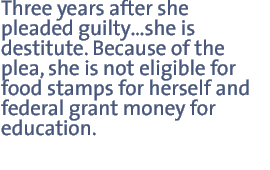|

Hearne is a town of 5,000 in East Texas. African Americans make up 44 percent of the population. The average median income is $20,000.
On Nov. 2, 2000, Erma Faye Stewart, then 30, a single mother of two, was arrested. Regina Kelly, a waitress, who was 24 at the time and a single mother of four, was also arrested. The arrests were part of a big drug sweep based on the word of a confidential informant who later would be proven unreliable. He implicated 25 men and two women in felony drug distribution charges. Many lived in a public housing project. All but one were African American. They claimed they were innocent but were jailed with bond set at $70,000 each.
Kelly and Stewart shared a cell; neither had been in jail before.* They put their faith in their court-appointed lawyers. When they went to court to meet their lawyers, both maintained their innocence and asked their lawyers to spend time investigating their case. But their lawyers, they say, gave them little time. (When asked by FRONTLINE about Stewart's case, her court-appointed lawyer had no recollection that she had ever been his client, although his name was on her plea agreement.)
Kelly and Stewart's court-appointed lawyers urged them to plead guilty, take probation and get out of jail. Kelly says she was told that if she didn't plead and instead went to trial, she could be facing "five to 99 years."
Three weeks after her arrest, Kelly's parents managed to get her bond reduced from $70,000 to $10,000 and she went home to await trial. Stewart stayed in jail.
But a week later, with no one to take care of her two small children and unable to stand being in jail alone, Stewart decided to plead guilty to delivery of a controlled substance of more than four grams in a drug-free zone. She was sentenced to 10 years probation and was required to pay $1,800 in fines and report to her parole officer monthly. An hour later, she was released.
Out of the 27 arrested in the Hearne, Texas drug sweep, Stewart was one of seven who pleaded guilty. Those who refused to take a plea, and couldn't post bond, spent five months in prison awaiting trial.
 |
 |
Update: Since this FRONTLINE report was broadcast (6/17/04), both Erma Faye Stewart and Regina Kelly have received letters and assistance from FRONTLINE viewers. They are very grateful.
|
| BACKGROUND | |
Regina Kelly is the lead plaintiff in an ACLU class action lawsuit filed in 2002 that charges racial discrimination by the D.A. and local police in the 2000 Hearne undercover drug bust.
|
 |
|
|
The first trial opened on Feb. 19, 2001. It soon became clear that the evidence was worthless, and that the confidential informant had lied to the prosecution. Within a few weeks, all the cases -- except those who had pleaded guilty -- were dismissed.
Regina Kelly says she wants "a formal apology" from the D.A. so she can clear her name in her small community. But the Robertson County D.A., John Paschall, told FRONTLINE that he believes all of those arrested are guilty, but says, "But I don't believe the state had enough evidence to convict them beyond a reasonable doubt."
No apology can help Erma Faye Stewart. Three years after she pleaded guilty in order to go home and take care of her children, she is destitute. Because of the plea, she is not eligible for food stamps for herself or federal grant money for education. She can't vote until two years after she completes her 10-year probation. And she has been evicted from her public housing for not paying rent. Her children sleep in various homes and she spends her nights outside the housing project, waiting for the the morning when she can go to work as a cook -- a job that pays $5.25 an hour. She owes a $1,000 fine, court costs and late probation fees which she has been pressured to pay. "They see it like, as long as I have a job, I can pay them," says Erma Faye. "I already told them, I'm having a hard time, buying my son medicine. I have to have his medicine for his asthma. They don't really care about that. All they want is, you know, the money."
Says Kelly, "I honestly don't believe she really understood the full extent of everything. She's a single mother. I'm a single mother. There is no way we can live without help from the government. We need that help and you cannot get that if you plea out to this."
Stewart will be under probation for at least seven more years. The fact that her case would have been dismissed with all the others, had she not taken the plea, makes no difference.
* Editor's Note, June 21, 2004: FRONTLINE made a factual error in reporting that neither Regina Kelly nor Erma Faye Stewart had been in jail before. Kelly spent one day in jail in 1995 and half a day in 1997; Stewart was once in jail overnight in 1999.
| |